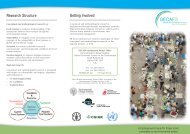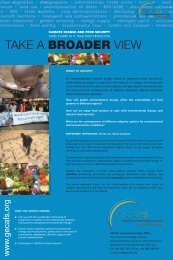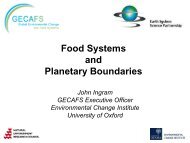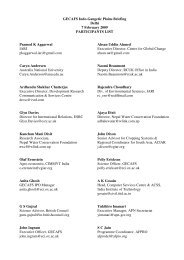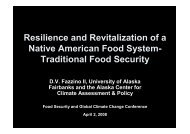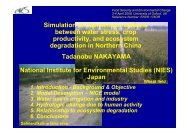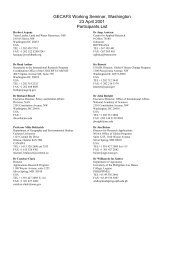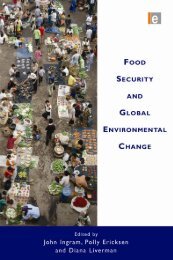awareness of the GEC issues within the policy and other stakeholder communities; (ii) ithelps raise awareness of the policy and resource management issues within the GEC sciencecommunity; and (iii) it identifies, and begins <strong>to</strong> build, a team of stakeholders keen <strong>to</strong> workcollaboratively.A powerful way <strong>to</strong> facilitate stakeholder involvement is through the use of participa<strong>to</strong>ryscenario exercises. These link research activities more closely <strong>to</strong> actual decision-makingprocesses and have shown considerable potential <strong>to</strong> provide a mechanism for involving arange of stakeholders and for facilitating communication between them. As discussed inPaper 5, there are three major benefits. First, participants in a scenario development processunderstand better the issues involved via structured dialogue. Second, scenario exercises offera ‘neutral space’ <strong>to</strong> discuss future challenges as uncertainty about the future has an‘equalizing effect’; no-one can predict the future, thus no-one can be proven ‘wrong’. Thisopportunity for open discussion also helps in engendering mutual respect, understanding andtrust, which is crucial for building effective research teams for follow-up activities. Finally,the discussion of, and reflection on, possible future trends can create the ground <strong>to</strong> revealconflicts, common views about goals, or different perceptions about <strong>to</strong>day’s challenges.Methodological developments for regional researchWhile the subsections above have identified numerous contributions <strong>to</strong> the food securityscience agenda, and especially when applied <strong>to</strong> the regional level, the planning, execution andreporting of such research is far from straight forward. This is due <strong>to</strong> the number of reasons:First, the stakeholder community at regional level is highly complex, embodying a widerange of different types of ac<strong>to</strong>rs operating on different scales at different levels. While it isimportant <strong>to</strong> recognise this complexity, the primary ‘client’ for the research does need <strong>to</strong> beclarified. This could be a regional or an intergovernmental body (e.g. SADC, EU), but theseare but one of four main categories of stakeholders (research, government, business and civilsociety) who operate on a similar spatial resolution (Paper 5). Determining how and when <strong>to</strong>engage with them is challenging as cultural and institutional fac<strong>to</strong>rs affecting science-policyrelationships (e.g. aims, timescale, success measures, evidence, quality control) oftenfrustrate engagement (Scott et al., 2005). Appreciating this is critical and the systematic stepslaid out in Paper 5 (Box 3) help overcome many of these problems. This also helps <strong>to</strong>establish innovative science plans through co-design. Paper 5 also discusses when <strong>to</strong> engagestakeholders and provides insights in organizing and understanding the complexity ofstakeholder engagement, contributing <strong>to</strong> the concepts and practice of this area.Second, while the unit of analysis is defined as the region, research could require identifyinga number of case study sites so as <strong>to</strong> establish, for instance, the heterogeneity of a givenvariable across the region. Choosing case study sites can be politically and well asscientifically complex, so clear criteria are needed. Contributions <strong>to</strong> best practise includechoosing sites that lie along gradients of, for example, anticipated temperature andprecipitation change or current and anticipated grazing pressure. The sites should also112
provide sufficient representation of, for instance, (i) different governance arrangements (e.g.land tenure); (ii) different land management (e.g. principal farming systems); and (iii) keydrivers in regional scenarios (e.g. demography).Third, establishing institutional buy-in at the regional level can be difficult, as it includesnegotiating with a potentially wide range of research partners (government labs, universities,NGOs and private sec<strong>to</strong>r) and donors. Research on food security, and especially whencoupled with GEC issues, is complex and full of uncertainties. It can take time for results <strong>to</strong>become apparent, which challenges timeframes for funding and the information needs of the‘client’. Co-planning helps all partners grasp these realities, and take an active interest in theproject. An example of how and why different communities ‘buy-in’ <strong>to</strong> a research agenda ingiven in Paper 6 (Box 5).Encouraging regional research networks helps overcome many of these challenges asmembers of the network bring different skills and contacts <strong>to</strong> the other stakeholders. Teambuilding can be promoted through the adoption of standardized methods, and the use of theparticipa<strong>to</strong>ry scenario exercises, as discussed above. The use of scenarios methods can alsohelp stakeholders <strong>to</strong> see the links between spatial levels (global <strong>to</strong> regional; regional <strong>to</strong> local),although ‘downscaling’ and ‘upscaling’ scenarios both present their own methodologicalchallenges.The scientific contribution of integrating the approaches: from traditional agronomy <strong>to</strong>production ecology and agroecology <strong>to</strong> ‘food system ecology’Lessons from production ecology, agroecology and human ecologyAs discussed in the Introduction and Paper 2, much of the work on food security stems fromagricultural science generally, and empirical agronomy in particular. Such work has made amassive contribution <strong>to</strong> enhancing food production and removing the threat of famine formany, and its importance both his<strong>to</strong>rically and in<strong>to</strong> the future is clear. The interest in gaininga more mechanistic understanding of food production (and crop growth in particular) hashowever led <strong>to</strong> the development of ‘production ecology’(van Ittersum and Rabbinge, 1997)and the broader concept of ‘agroecology’(Dalgaard et al., 2003). Both have emerged overrecent decades as key areas of research and much energy has been directed <strong>to</strong>wards thedevelopment of mechanistic models <strong>to</strong> both explore the impact on crop growth of scenariosof changing environmental conditions and also <strong>to</strong> challenge theories thereby enhancingmodel structure.<strong>Production</strong> ecology initially considered limitations <strong>to</strong> crop growth, i.e. what determinesproductivity, or ‘yield’. Attention was first placed on the ‘crop system’ and in particular oncrop characteristics, radiation, temperature and CO 2 as fac<strong>to</strong>rs that fundamentally define the‘potential’ crop growth. Water and nutrients were then incorporated as fac<strong>to</strong>rs that limit cropgrowth (i.e. the ‘attainable’ yield within the ‘cropping system’). Pests, diseases, weeds and113
- Page 1 and 2:
From Food Production to Food Securi
- Page 3 and 4:
From Food Production to Food Securi
- Page 5 and 6:
Table of ContentsAbstract .........
- Page 7 and 8:
Paper 6: Undertaking Research at th
- Page 9:
AbstractFood security is a conditio
- Page 12 and 13:
2010 about 925 million people had t
- Page 14 and 15:
water) are used, and reduce negativ
- Page 16 and 17:
While the flow of the argument abou
- Page 18 and 19:
determine interactions along and be
- Page 20 and 21:
Paper 3: A Food Systems Approach to
- Page 23:
From Food Production to Food Securi
- Page 26 and 27:
concerns and are now issues that mu
- Page 28 and 29:
the relationships between GEC and f
- Page 30 and 31:
Theme 2 aims to understand how comm
- Page 32 and 33:
GEC and the Food System of the Indo
- Page 34 and 35:
Paper 2: The role of agronomic rese
- Page 36 and 37:
These advances have resulted from a
- Page 38 and 39:
Crop selection to determine mechani
- Page 40 and 41:
Agronomic science is central to imp
- Page 42 and 43:
Agronomic research in relation to f
- Page 44 and 45:
The discussion above identifies a n
- Page 46 and 47:
interventions and political inertia
- Page 48 and 49:
While research on producing food ha
- Page 50 and 51:
Box 1 Food system Activities and fo
- Page 52 and 53:
In addition to broadening the debat
- Page 54 and 55:
options. Examples already seen rang
- Page 56 and 57:
Figure 3 Outcomes for 10 variables
- Page 58 and 59:
Figure 4 Nine ‘planetary boundari
- Page 60 and 61:
Figure 5 Environmental change, food
- Page 62 and 63:
Table 1: Indicative analysis of the
- Page 65:
From Food Production to Food Securi
- Page 68 and 69:
Trade Agreement (NAFTA) and the Eur
- Page 70 and 71:
Parry et al., 2005). Conducting foo
- Page 72 and 73: is provided in the ESF/COST Forward
- Page 74 and 75: Paper 5: Engaging Stakeholders at t
- Page 76 and 77: into actions (strategies, policies,
- Page 78 and 79: Box 2 Engaging with stakeholders in
- Page 80 and 81: Box 3 Setting the research agenda f
- Page 82 and 83: Third, and of considerable practica
- Page 84 and 85: Figure 2: Organizing and understand
- Page 86 and 87: organizations made up of numerous n
- Page 88 and 89: Elements of good practice in stakeh
- Page 90 and 91: Finally, it is worth noting that fo
- Page 92 and 93: development (Lee, 1999; Gunderson a
- Page 94 and 95: Box 7 The GECAFS stakeholder survey
- Page 96 and 97: ‘break down’ what might be a hi
- Page 98 and 99: Paper 6: Undertaking Research at th
- Page 100 and 101: agriculture in many parts of the wo
- Page 102 and 103: gaps. The presence of a strong tech
- Page 104 and 105: an average of two years to coalesce
- Page 106 and 107: Institute for Meteorology and Hydro
- Page 108 and 109: Identifying case study sitesResearc
- Page 110 and 111: can both benefit from and contribut
- Page 112 and 113: Box 5 Mapping stakeholder interests
- Page 114 and 115: Holding planning meetings in locati
- Page 116 and 117: This reorientation of the debate fr
- Page 118 and 119: Importance of this type of research
- Page 120 and 121: Integrating the food system concept
- Page 124 and 125: pollutants were then introduced as
- Page 126 and 127: communities operating in food syste
- Page 128 and 129: Improving input-use efficiency acro
- Page 130 and 131: governance focuses on the range of
- Page 132 and 133: Developing research agendas in supp
- Page 134 and 135: The renewed approach to interdiscip
- Page 136 and 137: BIELAK, A., HOLMES, J., SAVGÅRD, J
- Page 138 and 139: EAKIN, H. 2010. What is Vulnerable?
- Page 140 and 141: GODFRAY, H. C. J., BEDDINGTON, J. R
- Page 142 and 143: INGRAM, J. S. I. & FERNANDES, E. C.
- Page 144 and 145: LYUTSE, S. 2010. The One Billion To
- Page 146 and 147: RAYNER, S. & MALONE, E. L. 1998. Hu
- Page 148 and 149: UNDP 2006. The 2006 Human Developme
- Page 150 and 151: activities “from plough to plate
- Page 152 and 153: contribution to the science agenda:
- Page 154 and 155: urgently needed, and - given the gr
- Page 156 and 157: GECAFS plannenmakerij stelde vast d
- Page 158 and 159: ieder hun eigen groep van betrokken
- Page 160 and 161: het gebied van beheer hebben betrek
- Page 162: Curriculum VitaeFollowing a BSc in



